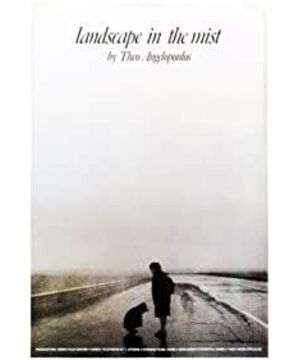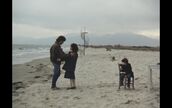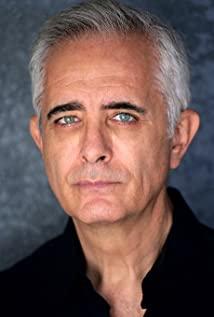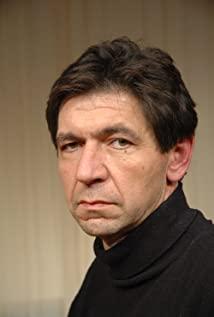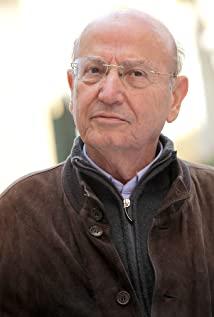Why do people embark on a journey? Almost all Angelopoulos' films are about journeys, moving around in space and time, asking questions about coming and going. There are only a dozen films in his life, which are self-questioning and self-confirmation. Individual questions are entangled with ultimate questions, and he wants to give understanding and answers again and again. ——In a post-modern context, a director who talks about such modernism will feel that we have gone behind the unbearable weight of life. Because we have gone, we have to face the unbearable lightness of life.
"Landscape in the Mist" is an extremely painful pursuit. Angelopoulos threw the two children into the world, letting the powerless and innocent them take on the task of "finding their father". He actually has the determination to face this problem, and he actually trusts the movie format. Although at the beginning, the significance of this movie's theme was too obvious, and the language was too slow and too elaborate. We saw two children, Ula and Little Alexander, go to the station every day to wait for an international express train to Germany, because my mother said that my father was in Germany. These two had never seen father’s bastard, and got on the train because of a lie, and then they encountered all kinds of people and things-these people and things do not follow the principle of realism, sometimes on the level of composition and symbolism. The meaning is more important, but they are not completely just scenes that are difficult to understand. They can be communicated at the same time on the aesthetic, emotional and ideological level.
These scenes intertwined together are like dreams. There is no strict logical clue, but it is like some lingering pictures in memories, reuniting with people in dreams. These scenes seem lonely, without a reason, but heavy and cannot be shied away. On a snowy night, Ula and Little Alexander walked outside a house. Someone was holding a wedding. A trailer was dragging a dying horse. Little Alexander held the horse and wept bitterly. The bride and the bride cried out in the quarrel outside the house. In the singing, dancing and dancing room of the wedding crowd, the two children and the horse seem not to belong to this world, and it seems that this world does not belong to others. Where are you going to come from? Can the answer to this question really be found, or is it really possible to find it? The children in the celebration and in the snow are still ignorant of this issue, so let's go on the journey bravely.
Then there is always snow and rain, and the depressed gray blue continues. They meet good people and bad people. In the movie, there is no moral judgment on the good and the bad. It was a good guy who asked little Alexander to clean up the bottles and give him a sandwich. The flight attendant who asked the station to take care of his siblings before getting on the bus was a good guy, and the truck driver who raped Little Ula was a bad guy. However, the good and the bad seem to have to be encountered, and from this point of view, they are even the same. The scene of Little Wula being raped is a mid- to long-range view. The truck’s hood is down, and the long motionless lens is only the roar of passing cars, a long pause, then the driver comes down, and then Wula’s legs. Exposed under the hood, her white socks were dirty and were taken to her ankles. All the pain was not confided, and even in the next scene, the scene of her wiping blood on the car wall was silent. Why are you looking for dad? If there is a father, can you answer this question: Why do people come to this world to receive all this? While Alexander was packing up the bottles in the small restaurant, an old man suddenly pushed in and played a violin, and then the owner scolded him away. This is one of the most beautiful passages in the movie, and it has been tempered with golden shavings from the humblest part of life. But no matter how bright this golden shavings were, it was also a glimmer of light passing by.
"It's raining, and the wings are wet." Before Ulla and little Alexander set off, little Alexander greeted a lunatic in the lunatic asylum. He stood on the hillside inside the barbed wire fence with his hands stretched out and doing flying movements. This lunatic was actually Oresti, the driver of that troupe, whom Ula and Alexander later met. He is like an angel falling from the sky, leading the siblings for a long way. The metaphor of this part is almost too obvious. The troupe that has not performed is lost, and the tradition cannot be restored. When the modern era came, they sold the last costumes on the beach. And Osoos, who let little Alexander sit in front of the motorcycle and Ula in the back, failed to become their asylum in the end. He was their equally confused brother, not their father. This role reminds people of the madman in Fellini's "The Road", who is also an angel with heavy wings and can no longer fly back to heaven.
The scene of Little Ula holding Oristi crying is heartbreaking, her love has not yet begun, she has been lost. She and her brother walked to another small railway station, and she didn't have enough money to buy a ticket to the border. Little Wula stood in front of a soldier by the side of a platform and said to him: "Give me 385 yuan." She was quiet, but she was no longer a little beggar. She knew that she could make a deal, so she could So peaceful. The soldier couldn't face her, he understood her gesture, and couldn't accept his own gesture, he was a good person. He walked between the two rows of trains, and grass grew out of the barren track. Little Ula followed. He threw the money aside, and fled the little girl like a deserter.
A person, a little girl, has to experience these physical and love pains, breakage and loss, deprivation and giving, malice and kindness, before finally growing up. She persisted to this point, she still had to take her innocent little brother, and she still wanted to find her father. Find a beginning and a reason. This is really cruel.
After the gunfire at the border. The picture has been dark for a long time. Then I heard the voice of little Alexander in the dark. The light diffused, blurring away. There is a tree on the hillside in the fog. ——This is the "Scenery in the Mist", is it something we can really find? Why don't we stop at a certain moment in this journey? Is this Angelopoulos's determination, or his limitation?
As an initial and final philosophical question, it is unsolvable. What Angelopoulos provides is film language and poetry. He probably realized this, so Osoos picked up a small strip of film in the trash can and told his brother and sister the result: There was fog and trees. Philosophy finds a rest here in art. His film language has a poetic texture, the lens becomes an image, and he moves firmly to the question in the clarity, exposing the memories and hopes together.
View more about Landscape in the Mist reviews


